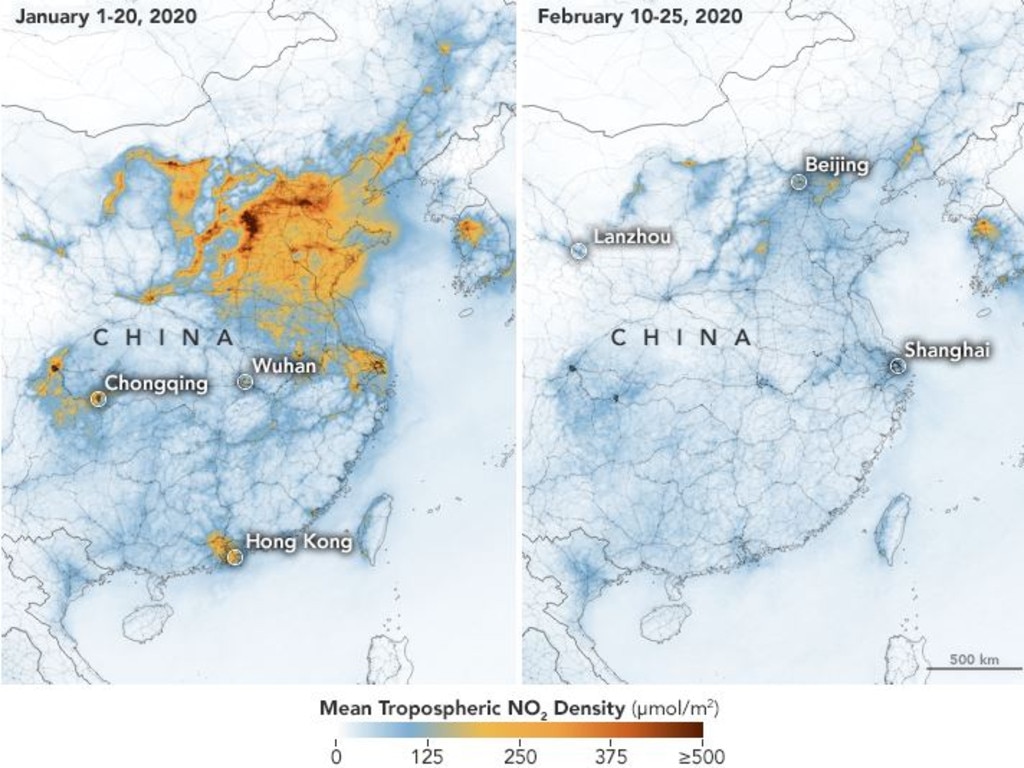The unlikely positives from coronavirus outbreak
It’s not all doom and gloom as the coronavirus pandemic sweeps the world, with dolphins returning to waterways, canals clearer in Venice and less air pollution in China.
With hundreds of thousands of cases and countless deaths, it’s hard to imagine there are any positives to come out of the coronavirus pandemic.
But people are taking some solace is the benefits that have come from crowds reducing thanks to forced isolation across the world.
In the most notable, reports estimate that China’s lock down has saved more than 100 million tonnes of carbon dioxide emissions from entering the atmosphere.
That’s about the equivalent of what Chile produces in a year.
RELATED: All your questions about coronavirus answered
RELATED: Countries coronavirus has been confirmed

NASA and the European Space Agency pollution monitoring satellites have also detected significant decreases in nitrogen dioxide over China. The noxious gas is emitted by cars, power plants and industrial facilities.
According to NASA scientists, the reduction in NO2 pollution was first apparent near Wuhan, but eventually spread across the country.
“This is the first time I have seen such a dramatic drop-off over such a wide area for a specific event,” Fei Liu, an air quality researcher at NASA’s Goddard Space Flight Centre, said.
Mr Liu said there was a drop off over several countries during the economic recession that started in 2008, but the decrease was more gradual.
Similar effects are being reported in other countries, while the Italian city of Venice is experiencing clearer water in its canals.
Italy is one of the worst hit regions for the deadly virus, but residents in Venice are praising the small upside that many have never seen before.
Its world-famous canals are clear due to a lack of debris from tourists and near-zero boat traffic under Italy’s ongoing lockdown.
Since March 9, the city, like the rest of Italy has been a so-called “red zone” with hotels, restaurants, cafes and most businesses shuttered, and residents ordered to stay inside and avoid travel.
“Stay at home — and nature thanks you,” Italian woman Monica La Rosa wrote on Facebook.
Venice hasn't seen clear canal water in a very long time. Dolphins showing up too. Nature just hit the reset button on us pic.twitter.com/RzqOq8ftCj
— Gianluca De Santis (@b8taFPS) March 17, 2020
After a week of lockdown... The canals in Venice are all clear and full of fishes. Kinda gives you the idea what will happen to Earth without Humans! pic.twitter.com/FVc7N8vmty
— TheSpaceAcademy.org✨🔠(@ThespaceAcad) March 17, 2020
Elsewhere in Italy people are posting photos of dolphins, swans and ducks returning to waterways.
Dolphins appear to be thriving in the Sardinian city of Cagliari.
But Pierpaolo Campostrini, managing director for the Consortium for Managing Scientific Research on Venice Lagoon System, told ABC the water wasn’t better quality, just less sediment was being stirred up.
“The low turbidity of the water does not mean cleanliness,” he said.
“The transparency is due to the absence of sediment resuspension.”
Scientists say there are lessons to be learned from the outbreak’s impact on the environment.
“If we can think about how to prepare for climate change like a pandemic, maybe there will be a positive outcome to all of this,” Christopher Jones, lead developer of the CoolClimate Network, an applied research consortium at the University of California, Berkeley, told NBC News.
"We can help prevent crises in the future if we are prepared. I think there are some big-picture lessons here that could be very useful."




